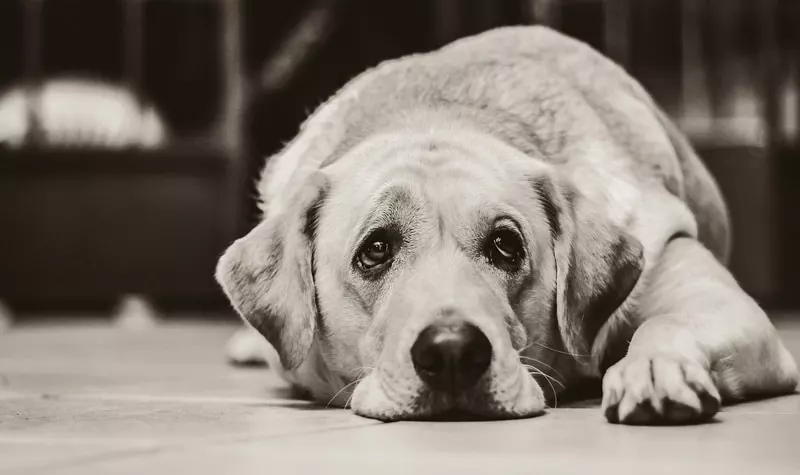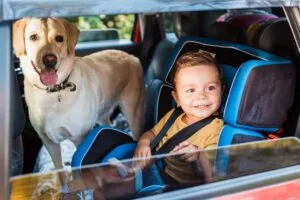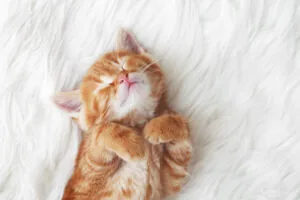Potential Behavior Changes in Senior Dogs and How to Cope with Them

As our dogs get older, their behavior will start to change—they’ll become less active, calmer, and will most likely sleep longer. But there are other changes that your dog may go through that could cause you a little bit more concern, such as sudden separation anxiety, destructive behavior, or house soiling. The following is a list of potential behavior changes and how you can help your dog through them.
Separation Anxiety
Separation anxiety can occur when you are away from your dog for a period of time. Some signs that your pup may be struggling with it are:
- Pacing, panting, salivating, hiding, or trembling.
- House soiling, destructiveness or vocalizing (barking or howling) that occur when you leave
- Refusal to eat food or treats when left alone
Treatment for separation anxiety starts with bringing your dog to the vet so you can make sure there are no underlying medical problems that are causing her behavior. Once you do this, be sure to provide your pup with interesting things to do when you are away– puzzle toys with hidden treats are always great options. Make sure you’re not making a big deal when leaving the house; often, our dogs pick up on our emotions and can become anxious if they sense that we are, as well. Act calm and collected, and hopefully your pup will, too.
Excessive Vocalization
Many medical conditions can contribute to your dog’s excess vocalization, such as hearing loss or cognitive dysfunction. Visit the vet so he can test for and treat any medical issues. If your pup’s gotten a clean bill of health, it’s time to do some digging to find the potential triggers of his sudden barking. He may be experiencing separation anxiety, he may be bored, or he may just be longing for some more attention. Often, providing toys and a bit more training can help. Be sure to talk with your vet about any questions you may have!
Restlessness
Dogs that sleep more during the day can become more restless and active at night. Sight or hearing loss can affect how well your dog sleeps. Have your vet do a complete examination to look for medical problems that could cause restlessness. Any medical problems should be treated first, and then, if necessary, you can gently retrain your dog to reestablish a normal sleeping routine. Try increasing his daytime activity by giving him frequent walks, playing his favorite games, practicing obedience or tricks, and giving him food-puzzle toys and bones to chew.
Aggression/Destructive Behavior
There are many things that can contribute to an increase in your pup’s aggressive or destructive behavior. Medical conditions that affect your dog’s appetite, mobility, or senses can lead to increased destructive behavior. Aggression can also occur when a new pet or human is added to the family dynamic, of when someone goes away (such as through a death or divorce).
Your senior dog may also suddenly start licking, sucking or chewing body parts or household objects, or start scratching and digging excessively. Prevention is key, here–make sure not to leave things out that can he can easily grab and destroy. Giving him adequate exercise, training, and toys can also help nip any problems in the bud.
Fears and Phobias
Older dogs can suffer from fears and phobias that they never had before, such as being frightened of thunderstorms, strangers, or even certain places. After taking your dog to the vet to rule out the possibility of a medical issue, you can take steps to change his behavior. Try keeping your dog away from whatever triggers his fears or phobia, or try masking any noises he fears with background music. If you know strangers will be coming over to your house, keep your dog in a different room to ease his stress. Finding out what he fears and doing your best to head them off are the things that will help him the most.
House Soiling
As with all the behavior problems covered here, a trip to the vet is your first step in figuring out the underlying issue! Fluffy may be experiencing bladder problems in his old age, so he could be having trouble controlling himself if you are gone for long periods of time. Approach this issue as if you were approaching an un-housebroken puppy. Make sure to closely monitor your pup when he is indoors, perhaps utilize a training crate at night or when you are away, and take him outside for frequent potty breaks. Consider hiring a dog walker or providing your dog with a place indoors to eliminate, such as newspapers or a potty pad, if you aren’t able to take him outside often.
. . .
Our dogs are important members of our family at any age, so make sure they are getting the proper care they need. With a little understanding of potential behavioral issues, and frequent trips to the vet, you can rest assured that your dog lives a happy and healthy life!
Share This Post
Recent Posts
About Shallowford Animal Hospital
Shallowford Animal Hospital and The Pet Spa at Shallowford are dedicated to the exceptional, compassionate care your pet deserves. Pets hold a very special place in our families, and we treat yours like our own.



